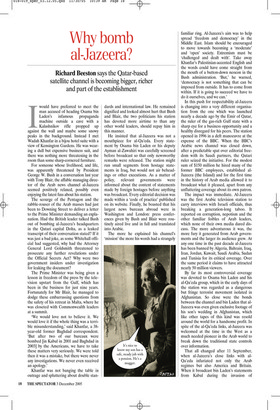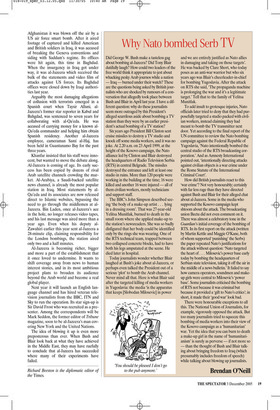Why bomb al-Jazeera?
Richard Beeston says the Qatar-based satellite channel is becoming bigger, richer and part of the establishment Iwould have preferred to meet the man accused of heading Osama bin Laden’s infamous propaganda machine outside a cave with a Kalashnikov rifle propped up against the wall and maybe some snowy peaks in the background. Instead I met Wadah Khanfar in a bijou hotel suite with a view of Kensington Gardens. He was wearing a dull but expensive business suit, and there was nothing more threatening in the room than some sharp-cornered furniture. For someone whose livelihood, and life, was apparently threatened by President George W. Bush in a conversation last year with Tony Blair, the affable managing director of the Arab news channel al-Jazeera seemed positively relaxed, possibly even enjoying the latest fuss about his station.
The scourge of the Pentagon and the rabble-rouser of the Arab masses had just been to Downing Street to deliver a letter to the Prime Minister demanding an explanation. Had the British leader talked Bush out of bombing al-Jazeera’s headquarters in the Qatari capital Doha, as a leaked transcript of their conversation stated? If it was just a bad joke, as some Whitehall official had suggested, why had the Attorney General Lord Goldsmith threatened to prosecute any further revelations under the Official Secrets Act? Why were two government insiders under investigation for leaking the document?
The Prime Minister was being given a lesson in freedom of the press by the television upstart from the Gulf, which has been in the business for just nine years. Fortunately for Mr Blair, he managed to dodge these embarrassing questions from the safety of his retreat in Malta, where he was closeted with Commonwealth leaders at a summit.
‘We would love not to believe it. We would love it if the whole thing was a terrible misunderstanding,’ said Khanfar, a 38year-old former Baghdad correspondent. ‘But after two of our bureaux were bombed [in Kabul in 2001 and Baghdad in 2003] by the Americans, we have to take these matters very seriously. We were told then it was a mistake, but there were never any investigations. We never even received an apology.’ Khanfar was not banging the table in outrage and spluttering about double stan dards and international law. He remained dignified and looked almost hurt that Bush and Blair, the two politicians his station has devoted more airtime to than any other world leaders, should repay him in this manner.
He insisted that al-Jazeera was not a mouthpiece for al-Qa’eda. Every statement by Osama bin Laden or his deputy Ayman al-Zawahiri was carefully screened before broadcast so that only newsworthy remarks were released. The station might run small segments from hostage statements in Iraq, but would not air beheadings or other executions. As a matter of policy, relevant governments were informed about the content of statements made by foreign hostages before anything was broadcast. Every editorial decision was made within a ‘code of practice’ published on its website. Finally, he boasted that his largest news bureaux abroad were in Washington and London: press conferences given by Bush and Blair were routinely aired live and in full and translated into Arabic.
The more he explained his channel’s ‘mission’ the more his words had a strangely familiar ring. Al-Jazeera’s aim was to help spread ‘freedom and democracy’ in the Middle East. Islam should be encouraged to move towards becoming a ‘moderate’ and ‘open’ society. Extremism must be ‘challenged and dealt with’. Take away Khanfar’s Palestinian-accented English and the words could have come straight from the mouth of a button-down neocon in the Bush administration. ‘But,’ he warned, ‘democracy is not something that can be imposed from outside. It has to come from within. If it is going to succeed we have to do it ourselves, and we can.’ In this push for respectability al-Jazeera is changing into a very different organisation from the one which was launched nearly a decade ago by the Emir of Qatar, the ruler of the gas-rich Gulf state with a sharp eye for a business opportunity and a healthy disregard for his peers. The station opened in 1996 in a deft manoeuvre at the expense of the BBC. When the BBC’s Arabic news channel was closed down, after a predictable spat over editorial freedom with its Saudi partners, the Qatari ruler seized the initiative. For the modest sum of $150 million he hired many of the former BBC employees, established alJazeera (the Island) and for the first time in the history of Arab media allowed it to broadcast what it pleased, apart from any unflattering coverage about its own patron.
The impact was immediate. Al-Jazeera was the first Arabic television station to carry interviews with Israeli officials, thus breaking a generation-long taboo. It reported on corruption, nepotism and the other familiar foibles of Arab leaders, which none of their own media dared discuss. The more adventurous it was, the more fury it generated from Arab governments and the larger its audience grew. At any one time in the past decade al-Jazeera has been banned by Algeria, Bahrain, Iraq, Iran, Jordan, Kuwait, Saudi Arabia, Sudan and Tunisia for its critical coverage. Over the same period it claims to have attracted nearly 50 million viewers.
By far its most controversial coverage was devoted to Osama bin Laden and his al-Qa’eda group, which in the early days of the station was regarded as a dangerous but fringe terrorist movement isolated in Afghanistan. So close were the bonds between the channel and bin Laden that alJazeera was even given exclusive footage of his son’s wedding in Afghanistan, which like other tapes of this kind was resold around the world for a handsome profit. In spite of the al-Qa’eda links, al-Jazeera was welcomed at the time in the West as a much needed pioneer in the Arab world to break down the traditional state controls over information.
That all changed after 11 September, when al-Jazeera’s close links with alQa’eda infuriated not only the Arab regimes but also America and Britain. When it broadcast bin Laden’s statements from Kabul during the invasion of Afghanistan it was blown off the air by a US air force smart bomb. After it aired footage of captured and killed American and British soldiers in Iraq, it was accused of breaking the Geneva conventions and siding with Saddam’s regime. Its offices were hit again, this time in Baghdad. When the insurgency in Iraq got under way, it was al-Jazeera which received the bulk of the statements and video film of attacks against US forces. Its Baghdad offices were closed down by Iraqi authorities last year.
Arguably the most damaging allegations of collusion with terrorists emerged in a Spanish court when Taysir Alluni, alJazeera’s former star reporter in Kabul and Bahgdad, was sentenced to seven years for collaborating with al-Qa’eda. He was accused of carrying money for a known alQa’eda commander and helping him obtain Spanish residency. Another al-Jazeera employee, cameraman Sami al-Haj, has been held in Guantanamo Bay for the past three years.
Khanfar insisted that his staff were innocent, but wanted to move the debate along. Al-Jazeera is coming of age. Its early success has been copied by dozens of rival Arab satellite channels crowding the market. Al-Arabiya, a Saudi-backed satellite news channel, is already the most popular station in Iraq. Most statements by alQa’eda and its associates are now released direct to Islamic websites, bypassing the need to go through the middlemen at alJazeera. Bin Laden, once al-Jazeera’s ace in the hole, no longer releases video tapes, and his last message was aired more than a year ago. Even when his deputy alZawahiri earlier this year sent al-Jazeera a 28-minute clip, claiming responsibility for the London bombings, the station aired only two and a half minutes.
Al-Jazeera is becoming richer, bigger and more a part of the establishment that it once loved to undermine. It wants to shift coverage away from news to human interest stories, and in its most ambitious project plans to broaden its audience beyond the Arab world and become a real global player.
Next year it will launch an English language channel and has hired veteran television journalists from the BBC, ITN and Sky to run the operation. Its star sign-up is Sir David Frost who was recruited as a presenter. Among the correspondents will be Mark Seddon, the former editor of Tribune magazine, soon to be al-Jazeera’s man covering New York and the United Nations.
The idea of blowing it up is even more preposterous than ever. When Bush and Blair look back at what they have achieved in the Middle East, they may have ruefully to conclude that al-Jazeera has succeeded where many of their experiments have failed.




























































 Previous page
Previous page